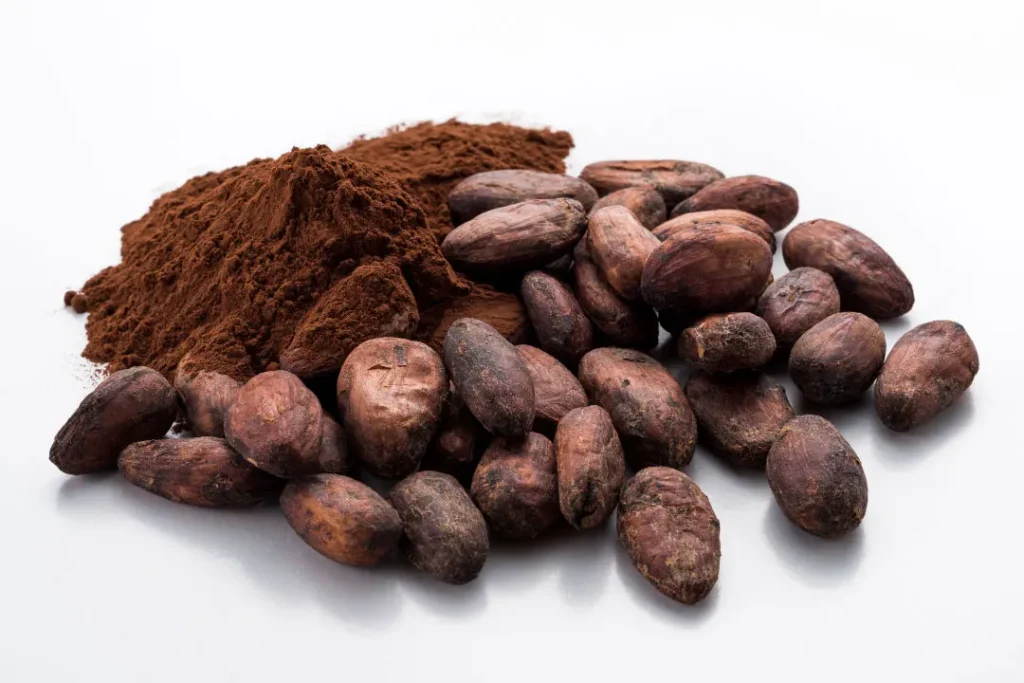The nutrient-dense pods of the carob tree (Ceratonia siliqua), a native of the eastern Mediterranean, have long been prized. Due to its sweet, somewhat cocoa-like taste, it is often used as a chocolate alternative, but its advantages go much beyond that. This page examines the chemical makeup of carob, its health advantages, any possible negative effects and drug interactions, as well as the ideal dose for human intake.
You May Also Like:
Adrenal Extract: Benefits, Dosage, Side Effects, Drug Interactions, and Other Important Information
Nature of Carob
The Ceratonia siliqua, sometimes known as the carob tree, is an evergreen plant species that is a member of the Fabaceae family.
The carob tree, which originated in the Mediterranean area, is today grown in appropriate temperatures all over the world. The fruit of the tree, sometimes known as carob pods, is eaten for its nutritional content. Small seeds found within these pods were sometimes used as a standard for weighing valuable stones, giving rise to the name “carat.”
Carob pods are well-liked in the culinary world due to their naturally sweet taste and distinctive flavor profile that is evocative of chocolate. Carob powder, which may be used as a healthy replacement for cocoa powder, is normally made from dried and crushed carob pods. Carob is a versatile component that may be used in a variety of ways, such as chips, flour, or powder.

Health Benefits of Carob
A growing record of scientific research points to various potential health benefits of frequent carob intake.
- Antioxidant Potential: The polyphenols in carob contain antioxidant properties important for scavenging dangerous free radicals, lowering oxidative stress, and avoiding illnesses like cancer and cardiovascular conditions associated with them.
- Digestive Health: Carob contains dietary fiber that improves gut health, encourages regular bowel movements, and may assist with weight control by encouraging sensations of fullness.
- Heart Health: The polyphenols in carob may be able to prevent LDL (low-density lipoprotein) oxidation, an important stage in the development of atherosclerosis.
- Blood Sugar Control: Carob is a great food option for those who want to control their blood sugar levels due to its high fiber content and low glycemic index.


Chemical Components of Carob
Carob is abundant in a wide range of crucial nutrients. Carbohydrates, proteins, lipids, and fibers makeup the majority of its ingredients. Numerous significant substances, including dietary fibers (galactomannans), bioactive substances (polyphenols, flavonoids), minerals (calcium, potassium, magnesium), and vitamins (particularly Vitamin A and B vitamins) have been shown to be present in these macronutrients.
Carob’s protein profile contains key amino acids including leucine, lysine, valine, and phenylalanine, while its sugar content is mostly made up of sucrose, glucose, and fructose. Carob’s fiber, which is mostly made up of insoluble fibers, helps to lower its glycemic index and increases satiety.
Polyphenols like flavonoids are important among its bioactive constituents because of their conceivable antioxidant, anti-inflammatory, and anti-carcinogenic effects.


Physiological Mechanisms of Action
Carob’s extensive nutritional profile, which includes bioactive substances including polyphenols and flavonoids, dietary fiber, and vital vitamins and minerals, is credited with its possible health advantages.
- Antioxidant Action: Flavonoids, in particular, are antioxidants found in carob polyphenols. These substances reduce oxidative stress and may prevent related disorders including cardiovascular disease and certain malignancies by neutralizing dangerous free radicals in the body.
- Gastrointestinal Control: Carob’s dietary fiber helps improve digestion by giving stools more volume and easing their transit through the digestive tract, encouraging regular bowel movements. Additionally, this fiber level increases satiety, which may help with weight control.
- Cardiovascular Health: Flavonoids in carob may prevent LDL cholesterol (bad cholesterol) from being oxidized. Atherosclerosis, a condition that may cause heart attacks and strokes, is risked by oxidized LDL.
- Blood Glucose Regulation: The high fiber content and low glycemic index of carob may help control blood sugar levels. Carob is a healthy food option for those with diabetes or for those who want to control their blood sugar levels since it contains dietary fiber, which slows the absorption of sugar into circulation and prevents increases in blood glucose and insulin levels.
New studies are expected to shed further light on the precise physiological mechanisms of carob’s bioactive components and how they interact with the human body at the molecular level.


Optimal Dosage
Although most people may safely consume carob, determining the “optimal dosage” is difficult since each person has different dietary requirements and physiological demands. However, as part of a balanced diet, daily consumption of 15 grams of carob fiber is advised for general health advantages.
Although such instances are uncommon, carob might cause an allergic response, just like any other food or supplement. Due to its high fiber content, overeating may potentially cause gastrointestinal problems including bloating or stomach cramps.
Potential Side Effects of Carob
The Food and Drug Administration (FDA) has designated carob as GRAS (Usually Recognized As Safe), meaning it is usually safe for the majority of people. However, adverse effects are a possibility with any diet or supplement.
- Allergic Reactions: Although uncommon, carob allergies are possible. Itching, hives, nausea, and in extreme circumstances, anaphylaxis, may all be symptoms.
- Digestive Problems: Due to the high fiber content of carob, excessive ingestion may cause digestive problems including bloating, gas, or stomach cramps.
- Drug Interference: Carob may prevent certain drugs from being absorbed because of its high fiber content.
It is essential to stop using carob and get medical help right away if any negative side effects occur. Before introducing any new dietary supplements, it is usually advisable to get medical advice, particularly for those using drugs or who have underlying health issues.


Potential Interactions with Other Substances
Information on carob’s interactions with other drugs is scarce. However, if taken concurrently with some drugs, its high fiber content may prevent them from being well absorbed. Before consuming carob, those who are on medication should speak with a healthcare provider.
Best Use of Carob
There are plenty of ways you can include carob in your diet, including carob chips, carob flour, and carob powder. you can substitute carob powder for cocoa powder in baking, use it as a sweetener in lieu of sugar, or use it as a thickener in soups and sauces. Additionally, because of its naturally sweet taste character, it is a great addition to smoothies and sweets.
While carob is a better substitute for many processed foods, its use should be moderated with a varied, nutrient-dense diet for the best possible health outcomes.
Carob:
Conclusion
Undoubtedly, carob is a versatile powder. From its diverse utility in baking to its health benefits and desirable flavor, it makes it a simple and attractive option to introduce into your food.
Like all consumables, however, you should take care when introducing carob into your foods for the first time. You’ll want to monitor how your body responds to small amounts of it and maintain full transparency with your healthcare provider during the process.
With the right moderation, you too can access the wonderful benefits of including carob in a holistic diet.
References:
- “Carob pod polyphenols suppress the differentiation of adipocytes through posttranscriptional regulation of C/EBPβ” Retrieved from: https://www.ncbi.nlm.nih.gov/pmc/articles/PMC7551307/
- “Carob Chips: The Caffeine-Free Chocolate Substitute that’s Actually Good for You” Retrieved from: https://draxe.com/nutrition/carob-chips/
- “Elevate your products with our two Carob Extracts.” Retrieved from: https://carobextract.com/
Important Note: The information contained in this article is for general informational purposes only, and should not be construed as health or medical advice, nor is it intended to diagnose, prevent, treat, or cure any disease or health condition. Before embarking on any diet, fitness regimen, or program of nutritional supplementation, it is advisable to consult your healthcare professional in order to determine its safety and probable efficacy in terms of your individual state of health.
Regarding Nutritional Supplements Or Other Non-Prescription Health Products: If any nutritional supplements or other non-prescription health products are mentioned in the foregoing article, any claims or statements made about them have not been evaluated by the U.S. Food and Drug Administration, and such nutritional supplements or other health products are not intended to diagnose, treat, cure, or prevent any disease.
